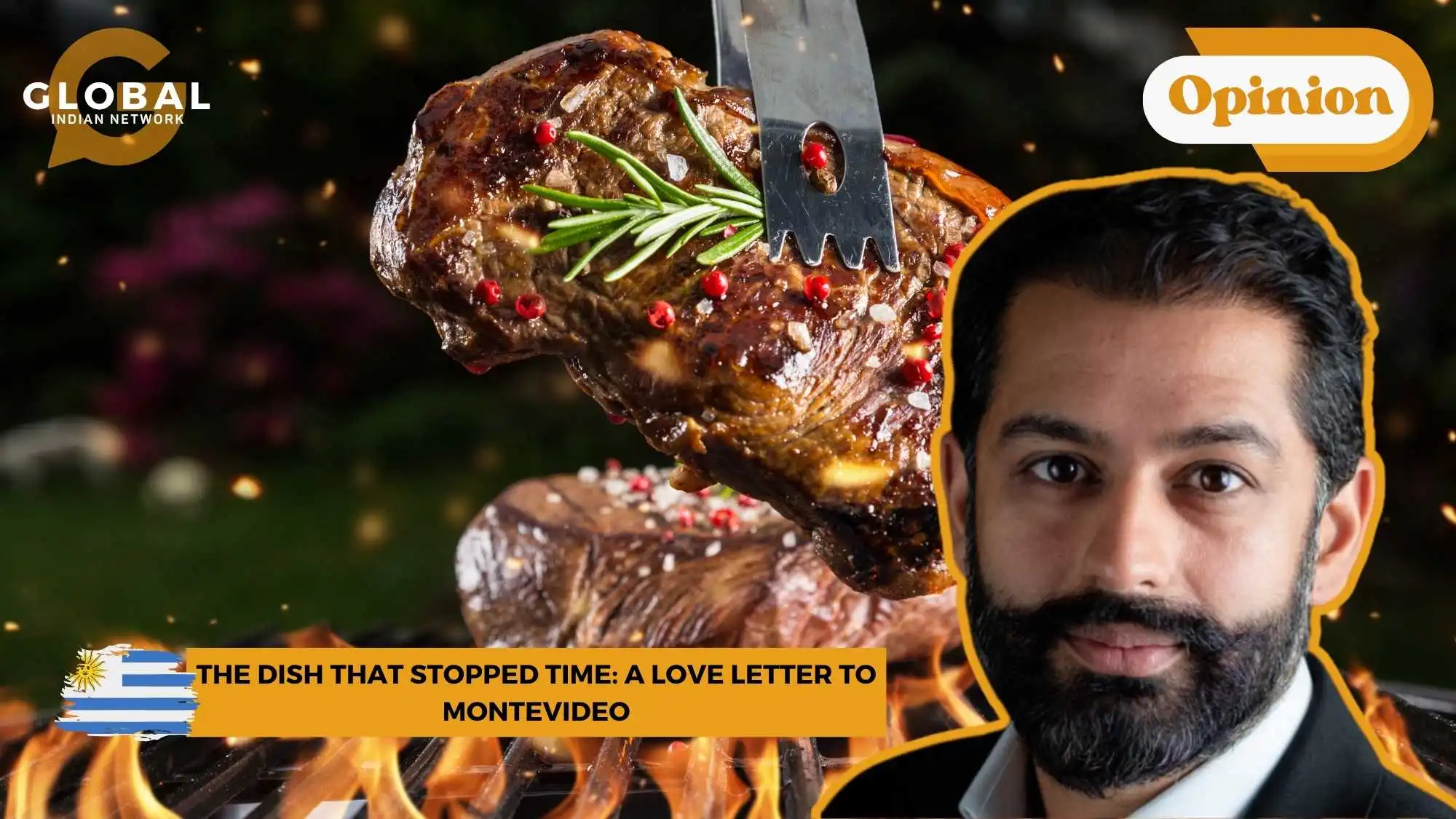There are cities you pass through and cities that pass through you. Montevideo, Uruguay’s quiet coastal whisper, doesn’t try to impress you. That’s the magic. It just is. Sometimes that’s all a place needs to be: itself, unapologetically.
I hadn’t planned on finding transcendence near the Port Market.
But alas, it found me.
The heat arrived before the flavor. Fire rising from a black iron parrilla, licking slabs of meat in rhythm with smoke curling toward the open sky. I sat with my colleague Lorena at a battered bar. Nothing fancy, but perfect in its imperfection. Mismatched stools, scarred wood, and the kind of laughter that lets you know you’re exactly where you’re meant to be. Conversations ricocheted between fútbol, politics, and how best to flip a tenderloin without offending its soul.
Across from us, a grill-man who looked equal parts dancer and war veteran moved with surgical grace. No rush. No gimmicks. Just the priestly precision of someone who’s spent a lifetime coaxing truth from flame. In front of him, a cathedral of meat cuts entrecot, picanha, peceto, vacio entero, chorizo, costilla, each piece seared with reverence until the sizzle of fat meeting fire silenced every other sound.

My plate landed like a rite of passage: a thick, marbled steak, kissed only by salt and time. No sauce. No garnish. No resting period. Just flesh, fire, fate. The first bite stopped everything. Time, thought, breath. Charred edges surrendered to a crimson interior so juicy poets would write bad sonnets about it. I tasted smoke, pasture, and something older than language. It didn’t just taste good. It felt like memory.
That night, I sent my wife a voice note, my words wobbling between reverence and disbelief. At dawn, I phoned her, still chasing vocabulary big enough to explain what had happened. Ever since, in every conversation we’ve shared and we speak daily, often multiple times, it inevitably surfaces: that steak. It has become a shared symbol, a compass point. A joke. A legend.
Lorena still laughs at how wide my eyes went. I probably did her head in with the gush of adjectives, but even she admits the experience belongs in some culinary hall of miracles. We’ve already sworn to return soon. To not go back would feel almost sacrilegious.

Here’s what made that steak truly special. It needed nothing. No pepper. No chimichurri. No artistic drizzle. It simply arrived. Centered. Silent. Unapologetic. A piece of meat that had no need to justify itself. It wasn’t trying to be impressive. It just was. That was enough. That was everything.
While we tried to process what had just happened, the soundtrack of the bar rolled on. A bartender, half amused, half annoyed, grumbled about a customer who’d requested a coffee that was twenty-three percent espresso, the rest milk, in an espresso cup. “How do you make something so precise?” he muttered to himself. That, too, is Montevideo. A place where precision is met with theatre, where absurdity is served with ceremony.
The bartender poured our glass of Tannat, as we had ordered. One of Uruguay’s great reds. Strong. Immensely strong. But it worked. Somehow it stood its ground against the steak, like two heavyweight fighters respecting each other’s power. It wasn’t just wine. It was a reckoning in a glass. I raised mine, and for a moment, the noise fell away again.
Montevideo doesn’t demand your attention. It rewards your presence. It doesn’t shout. It doesn’t sell itself. It simply exists, with quiet pride and smoky grace. And if you stay still long enough, it unfolds. It’s not a city of skyscrapers or curated skylines. It’s a city of silences, of subtle gestures. It’s a city that reminds you to pay attention.
Outside, the port hummed. Not with noise, but with presence. No smoke. No salt. No diesel. Just a kind of stillness wrapped in movement. The roads nearby felt almost museum-like, cobbled with stories, lined with buildings that stood not just as architecture but as allegory. Facades whispering history, balconies holding secrets, windows watching time. Montevideo doesn’t shout. It reveals. Inside, the warmth rose not just from the grill but from the people. That night felt like a tribute to something timeless. I thought of my friend Vikram Vij, a chef who understands the poetry of a perfectly cooked protein, the balance between restraint and revelation. He would have wept in joy or silence.

A few nights later, still haunted by that first steak, I tried to chase its ghost. This time, at a fancier restaurant closer to the hotel. It had the performance down: an open grill flickering in view, practiced chefs moving with studied ease, a curated wine list that could impress even the most seasoned palate. On paper, it should’ve worked.
But it didn’t do justice.
The steak arrived with all the ceremony of fine dining. It looked the part. It probably was technically correct. But something was off. It was like a student who had all the right answers, only to trip on their own shoelaces while walking into the exam room—falling flat, not because they didn’t know, but because they forgot the basics. The mundane undid the magic.
The meat lacked soul. It tried to impress rather than connect. Each bite was fine, pleasant, even, but vacant. There was no smoke memory, no echo of laughter, no sense that anything sacred had passed between fire and flesh. Just food, not feeling.
I paid. I smiled. I left.
I even mentioned all this during a meeting with Minister Pablo, Uruguay’s Minister of Tourism, a remarkable man. Incredibly warm, disarmingly friendly, and deeply attuned to the rhythm of his nation. He didn’t waste time on slogans. He spoke with quiet conviction about what Uruguay has to show the world, not through noise, but nuance.

Amidst our laughter about my steak epiphany, I noticed a book just outside his office. It was a modest volume, almost hidden in plain sight, yet it carried the weight of possibility. A quiet nod to other corners of Uruguayan cuisine still waiting to be discovered. It felt like a whisper: there’s more.
And that excites me. Because if one meal could leave me speechless, what else lies beneath the surface of this unassuming country? What other flavours, stories, fires? I came for meetings, but I left hungry not just for more steak, but for the soul behind every dish, every street, every softly spoken truth this nation holds.
P.S.: Of course, I returned again…and again…and possibly a few more times before leaving.
Let us know your thoughts. If you have burning thoughts or opinions to express, please feel free to reach out to us at larra@globalindiannetwork.com.









